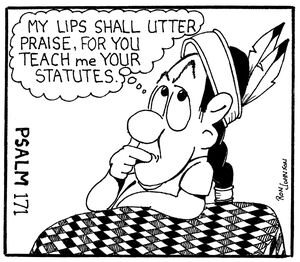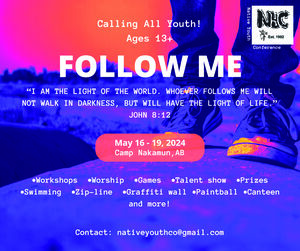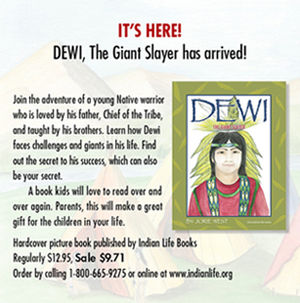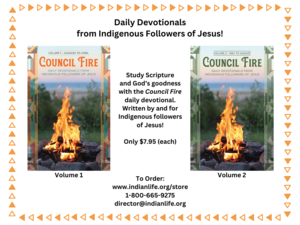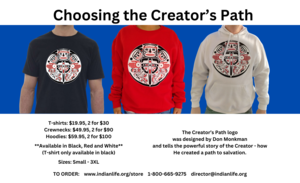My Walk on Creator's Path
Last updated 9/28/2013 at 11:56am

Wes Carlisle
My healing journey began in our cabin in northern Alberta in the early ’90s. I remember sitting on the floor crying out to God, asking Him how I could get back on my feet, how I could walk with Him. I felt like I had a spiritual flu. I was too heartsick to get up and perform. I had spent years studying God’s Word, only to slip back into judging who God was by my own circumstances. God answered me immediately with an astounding idea. He simply said, “Look at who I am.”
Each one of us has positive and negative factors that shape our lives—age, gender, health, appearance, personality, families, national cultures, religious backgrounds, finances, and education, to name a few.
Each of us functions within these. The Creator of the universe wants us to use these temporary variables; yet, He invites us to live beyond them.
I can’t remember a time when I didn’t want to know Jesus. For decades, I knew that the Bible was true and that Jesus was the Son of God, but I didn’t really know the wonder of it all. Now I feel more like Job when he declared, “Surely I spoke of things I did not understand, things too wonderful for me to know. . . . . My ears had heard of you but now my eyes have seen you” (Job 42:3b and 5).
I recall my excitement over having a part in a Christmas program at Messiah Lutheran Church in Denver, Colorado when I was five. I loved my red velvet dress and my shiny, patent leather shoes. My aunt taught my Sunday school class; I felt loved and secure. My walk with God was simple and happy in 1952.
My family moved from Colorado to Wyoming when I was seven. My two-year-old brother, Jay, was a PKU baby. This is a rare condition in which a baby is born without the ability to properly break down an amino acid called phenylalanine. Babies may have symptoms such as delayed mental and social skills, seizures, rashes, and tremors. By the time he was six months old he had become physically and mentally handicapped. Medical science had not yet discovered the cures they have today for this disease.
The doctors in Denver suggested that my parents move our family to a farm. We couldn’t afford to buy a farm so Dad went to work as a hired farmhand on the Wind River Indian Reservation. Although it is an Arapaho and Shoshone reservation, my mom, who was part Ponca, had cousins who lived there so that is where we went.
I’m not sure how good the doctor’s advice was for my parents. We had no running water for five years. My brother was not able to feed himself or be toilet trained. Disposable diapers did not exist. Mom and Dad worked hard for little money. In spite of the poverty, I enjoyed my time on the reservation. I made friends whom I still love today. Poverty wasn’t unusual in that area so I fit in with my friends; we even had outhouses at school. I prefer my inhouse rather than an outhouse, however, and I enjoy turning on a faucet to get hot and cold water.
The difficulty with this part of my story was my own childish interpretation of life and God. I analyzed who God was by looking at my circumstances. Since I had known an easier life in Denver, I equated our change in circumstances with a change in God’s feelings for my family.
I determined that God didn’t love our family as much as He loved other families. I concluded that if I could make God happy with us again, then life would be better, and I could have a happy family like other people.
I didn’t understand my parents’ sacrifices or struggles. I didn’t know or understand the joy of loving God for Himself.
We didn’t go to church much during those years. Mom read me stories out of my Bible storybook. We traveled to town occasionally to go to church, but I felt so out of place, especially on Easter, as I envied the ladies in their new dresses and fancy hats.
I often wonder why our childhoods carry such great influence into our adult lives. I piled many irregular stones onto my faulty-misconceptions-of-God foundation. A few jagged rock chips even landed on my shoulders.
One of my greatest sorrows was that my parents had to put my brother, Jay, into a care facility when he was seven. Jay lived there for over fifty years until his recent death.
When Dad no longer needed to work on a farm, he got a better job in town. Our town boasted nearly 10,000 people. Times were much simpler and more innocent then.
I enjoyed my high school years. I liked my studies, and I worked at a soda fountain in our local drug store. We made the tastiest chocolate sodas and thickest malts around. You could order a nickel or a dime coke, flavor it with cherry, chocolate, or vanilla, and discuss world philosophies or high school gossip for hours.
I did not go through major traumas like many wounded people, but I struggled with life without really understanding what I struggled against.
My girlfriend and I walked to church nearly every Sunday. We taught Sunday school and Vacation Bible School. I completed two years of catechism for confirmation into the church. Leaders told me I was going to heaven, but I knew inside that something was missing. My friend and I participated in the youth group, but I felt discouraged and angry with that; it seemed like a lot of meaningless social fluff.
The more I prayed to know God the more frustrated I became with church life. I remember stomping down the street at sixteen, telling God that He had better do something soon because I didn’t even believe in Him anymore.
My supposed lack of faith scared me so much that I enrolled in a prestigious Lutheran university to fix my instability.
I still remember orientation week. The young man leading my group asked us why we had chosen this particular university. I declared that I wanted to know God. I wanted to know what He said; I wanted direction for my life. The young man responded, “Well, that’s a naive and immature reason to be here. We are a liberal arts university. We are here to broaden your mind, not narrow it down.”
Looking back, I realize that he was probably just some upperclassman who didn’t know much, but I felt humiliated and angry. These people were supposed to give me answers. I had looked to them to give me direction and hope.
America seemed to take a drastic downward turn in 1965. Other young people must have been as frustrated as I was. I’m not sure what spawned what, but supposedly free love, the drug culture, and the hippie movement all came about the same time. Vulgar violence on the big screens replaced many family-friendly films. My friends went to Vietnam amidst angry war protests and civil unrest. University faculty encouraged us to put on a Christian smile and behave well while “God is Dead” posters littered our campus. I felt lost. After a year of school, I went back home and left the church.
Wes and I got engaged that summer, but fear and uncertainty clouded my joy after I got pregnant three months before our wedding. Many consider this condition normal today, but this was the mid ’60s. I brought great shame on my family and my community. I felt isolated from both.
Two weeks after our wedding, my dad got a new job and my family moved away. My two youngest brothers were still quite young so my parents had to raise their own family. I had no idea how to raise mine.
Our relationship with Wes’s parents was strained because of his mother’s harsh behavior. None of the family realized that her personality resulted from a brain injury. Sadly, doctors did not diagnose the problem until she was in her seventies. I often wish we would have known about the injury; it would have changed so much about how we handled life with her.
Wes and I were on our own at twenty, and shame began to run my life. Wes got a job in southern Wyoming and we moved our small eight by thirty-five foot trailer there a few months after the birth of our son.
We had purchased the trailer for $1,000 with the hope of going back to school, but, as life happened, it became our home for a few years. Our initial trailer court was full of gravel and weeds. I remember the proprietor yelling at us because we had not mowed our weeds. We had no money; we did not own a lawn mower. We laugh about this now, but it wasn’t funny at the time.
We lived one trailer away from the laundry, but I was too ashamed to go there to wash my clothes. I washed diapers out in the tiny bathtub and hung them all over the tiny house. The dry Wyoming wind blew through our flimsy windows so they dried quickly. I still remember that sense of accomplishment as I avoided the embarrassment of trekking to the washing machine. I sometimes wondered how a girl who had traveled a thousand miles away from home to go to university, where she didn’t know anyone, could suddenly find it impossible to walk two minutes to a washing machine in a crummy trailer court, but I had no answers so I pushed the question down deep into my soul.
I had been taught that Jesus had died for my sins, but I did not feel forgiven or loved by God. I did not feel clean. Through numerous circumstances, we met new friends and moved away from Wyoming to join a group of people in a little independent church with a controlling, spiritually abusive leader. We were too young and inexperienced to realize what we were getting into. We only knew that we finally had someone to give us life’s answers; we had a place to sacrifice and earn affirmation and acceptance. I had a place where I could work hard enough to get clean.
I thought that if I could please God then my life would have promise and meaning. I could get away from the gnawing pain of shame. Our lives are wonderful if we know God, but I had no understanding of what that really meant. I did not know the journey I would travel to gain that understanding. I thank God for His love, mercy, and grace. I thank Him for staying close to me during those difficult years.
Part of our journey fit in with the culture of the time; after all, we were the Baby Boomers. We demanded more than the dry norms of the “establishment.” We were going to be super Christians (without any knowledge of what that meant). We were the elite (another symptom of an abusive situation).
Sadly, we focused our eyes on our leader and on ourselves. Our pastor often manipulated us with the false notion that if we were in church on Sunday morning, then we liked the pastor. If we were there on Sunday morning and Sunday night, then we liked the church, but if we were there for both services on Sunday and Wednesday night (and sacrificially financed his current whim), then we proved that we loved God. I ignorantly set out to prove that I loved God.
In addition, I reasoned that my children had to love God. You can imagine the tragic results. Our family actually lived through a textbook case of spiritual abuse for twenty-three years.
My decisions about church, spiritual leaders, and religious practices brought me and my family tremendous grief. I loved my family, and my goal was to be the best wife, mother and Christian possible. Instead, I spent years sacrificing and working hard to be spiritual only to fail as a mother and a Christian.
Our church, which was more like a family, exploded when God revealed the truth to us. God had been trying to show us the problems for years, but we kept hanging on to our own hopes, dreams, and friendships.
I wish I had listened sooner. In the end, our friends dispersed to different states and countries. Thankfully, they had wanted to know God too, so they found places in other ministries. Wes and I ended up in Canada.
With the breakup of our church, I once again felt great shame. This time it was worse, because this time it involved everything I had done to be right; it involved my spiritual journey.
I don’t know a single person who has experienced a perfect life, without heartaches of one sort or another—painful physical or environmental circumstances, hurtful actions from other people or regrets over their own choices—but at this point everything I knew was reduced to rubble. I sifted through broken dreams and shattered trust trying to find something solid on which to stand. I struggled to find my footing, but I kept slipping on fear, anger, confusion, and shame.
My healing journey began in our cabin in northern Alberta in the early ’90s. I remember sitting on the floor crying out to God, asking Him how I could get back on my feet, how I could walk with Him. I felt like I had a spiritual flu. I was too heartsick to get up and perform. I had spent years studying God’s Word, only to slip back into judging who God was by my own circumstances.

Then the Lord graciously led Wes and me to new friends in British Columbia who patiently walked with us as we healed. They listened to our rage, prayed for us, and taught us grace and truth. It took time, spiritual care, and good spiritual food to bring healing to our broken lives.
God answered me immediately with an astounding idea. He simply said, “Look at who I am.” I remembered Romans 1:20 which says, For since the creation of the world God’s invisible qualities—His eternal power and divine nature—have been clearly seen, being understood from what has been made, so that men are without excuse.
In the silence of the north I rested with God’s Word and some science books. I started with the creation story. I quietly began to focus on the natural world around me. The night skies poured forth a message of encouragement. The fields and forests lent me a sense of calm. I rejoiced in nature’s variety and abundance. I tied Scriptures together with what I learned. Faith and joy began to filter through my fog of confusion, giving me the hope I needed to walk forward on God’s narrow road.
Then the Lord graciously led Wes and me to new friends in British Columbia who patiently walked with us as we healed. They listened to our rage, prayed for us, and taught us grace and truth. It took time, spiritual care, and good spiritual food to bring healing to our broken lives.
Yet, during this time, I came to understand that God’s nature and character, His love, patience, mercy and grace, are truly as remarkable as His magnificent creation.











